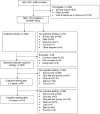Intakes of (n-3) fatty acids and fatty fish are not associated with cognitive performance and 6-year cognitive change in men participating in the Veterans Affairs Normative Aging Study - PubMed (original) (raw)
Intakes of (n-3) fatty acids and fatty fish are not associated with cognitive performance and 6-year cognitive change in men participating in the Veterans Affairs Normative Aging Study
Ondine van de Rest et al. J Nutr. 2009 Dec.
Abstract
High intake of fish and (n-3) PUFA may protect against age-related cognitive decline. However, results are inconsistent and limited data exist regarding changes in multiple cognitive functions over a longer period of time. In this study, we assessed the association between fatty fish intake as well as (n-3) PUFA intake with cognitive performance and cognitive change over 6 y in 1025 elderly men. Participants were from the Veterans Affairs Normative Aging Study. Cognitive function was assessed with a battery of cognitive tests focusing on factors representing memory/language, speed, and visuospatial/attention. Dietary intakes were assessed with a validated FFQ. We used general linear models to assess cross-sectional associations and mixed models to assess the associations over time. Models were adjusted for age, education, BMI, smoking, diabetes, and intake of alcohol, saturated fat, vitamin C, and vitamin E. The mean age of participating men was 68 y at baseline. Median fish consumption ranged from 0.2 to 4.2 servings/wk across quartiles. Cross-sectional analyses showed no association between fatty fish or (n-3) PUFA intake and cognitive performance. Longitudinal analyses, over 6 y of follow-up, also did not show any significant associations between fatty fish or (n-3) PUFA intake and cognitive change. In this population of elderly men, intake of neither fatty fish nor (n-3) PUFA was associated with cognitive performance.
Figures
FIGURE 1
Participant flow in the study from initiation to cognitive measures.
Similar articles
- Dietary intake of fatty acids and fish in relation to cognitive performance at middle age.
Kalmijn S, van Boxtel MP, Ocké M, Verschuren WM, Kromhout D, Launer LJ. Kalmijn S, et al. Neurology. 2004 Jan 27;62(2):275-80. doi: 10.1212/01.wnl.0000103860.75218.a5. Neurology. 2004. PMID: 14745067 - Cognitive performance in older adults is inversely associated with fish consumption but not erythrocyte membrane n-3 fatty acids.
Danthiir V, Hosking D, Burns NR, Wilson C, Nettelbeck T, Calvaresi E, Clifton P, Wittert GA. Danthiir V, et al. J Nutr. 2014 Mar;144(3):311-20. doi: 10.3945/jn.113.175695. Epub 2013 Dec 18. J Nutr. 2014. PMID: 24353345 - Fish consumption, intake of fats and cognitive decline at middle and older age: the Doetinchem Cohort Study.
Nooyens ACJ, van Gelder BM, Bueno-de-Mesquita HB, van Boxtel MPJ, Verschuren WMM. Nooyens ACJ, et al. Eur J Nutr. 2018 Jun;57(4):1667-1675. doi: 10.1007/s00394-017-1453-8. Epub 2017 May 9. Eur J Nutr. 2018. PMID: 28488130 - Dietary fatty acids, age-related cognitive decline, and mild cognitive impairment.
Solfrizzi V, Capurso C, D'Introno A, Colacicco AM, Frisardi V, Santamato A, Ranieri M, Fiore P, Vendemiale G, Seripa D, Pilotto A, Capurso A, Panza F. Solfrizzi V, et al. J Nutr Health Aging. 2008 Jun-Jul;12(6):382-6. doi: 10.1007/BF02982670. J Nutr Health Aging. 2008. PMID: 18548175 Review. - Omega-3 fatty acids and brain resistance to ageing and stress: body of evidence and possible mechanisms.
Denis I, Potier B, Vancassel S, Heberden C, Lavialle M. Denis I, et al. Ageing Res Rev. 2013 Mar;12(2):579-94. doi: 10.1016/j.arr.2013.01.007. Epub 2013 Feb 6. Ageing Res Rev. 2013. PMID: 23395782 Review.
Cited by
- Vascular Cognitive Impairment (VCI).
Rundek T, Tolea M, Ariko T, Fagerli EA, Camargo CJ. Rundek T, et al. Neurotherapeutics. 2022 Jan;19(1):68-88. doi: 10.1007/s13311-021-01170-y. Epub 2021 Dec 22. Neurotherapeutics. 2022. PMID: 34939171 Free PMC article. Review. - Treatment of memory loss with herbal remedies.
Serby MJ, Burns SJ, Roane DM. Serby MJ, et al. Curr Treat Options Neurol. 2011 Oct;13(5):520-8. doi: 10.1007/s11940-011-0135-8. Curr Treat Options Neurol. 2011. PMID: 21728018 - Cognition, dopamine and bioactive lipids in schizophrenia.
Condray R, Yao JK. Condray R, et al. Front Biosci (Schol Ed). 2011 Jan 1;3(1):298-330. doi: 10.2741/s153. Front Biosci (Schol Ed). 2011. PMID: 21196378 Free PMC article. Review. - The Relationship of Omega-3 Fatty Acids with Dementia and Cognitive Decline: Evidence from Prospective Cohort Studies of Supplementation, Dietary Intake, and Blood Markers.
Wei BZ, Li L, Dong CW, Tan CC; Alzheimer’s Disease Neuroimaging Initiative; Xu W. Wei BZ, et al. Am J Clin Nutr. 2023 Jun;117(6):1096-1109. doi: 10.1016/j.ajcnut.2023.04.001. Epub 2023 Apr 5. Am J Clin Nutr. 2023. PMID: 37028557 Free PMC article. - Behavioral experiences as drivers of oligodendrocyte lineage dynamics and myelin plasticity.
Tomlinson L, Leiton CV, Colognato H. Tomlinson L, et al. Neuropharmacology. 2016 Nov;110(Pt B):548-562. doi: 10.1016/j.neuropharm.2015.09.016. Epub 2015 Sep 28. Neuropharmacology. 2016. PMID: 26415537 Free PMC article. Review.
References
- Lopez AD, Mathers CD, Ezzati M, Jamison DT, Murray CJ. Global and regional burden of disease and risk factors, 2001: systematic analysis of population health data. Lancet. 2006;367:1747–57. - PubMed
- Kalmijn S, van Boxtel MP, Ocke M, Verschuren WM, Kromhout D, Launer LJ. Dietary intake of fatty acids and fish in relation to cognitive performance at middle age. Neurology. 2004;62:275–80. - PubMed
- Kalmijn S, Feskens EJ, Launer LJ, Kromhout D. Polyunsaturated fatty acids, antioxidants, and cognitive function in very old men. Am J Epidemiol. 1997;145:33–41. - PubMed
- van Gelder BM, Tijhuis M, Kalmijn S, Kromhout D. Fish consumption, n-3 fatty acids, and subsequent 5-y cognitive decline in elderly men: the Zutphen Elderly Study. Am J Clin Nutr. 2007;85:1142–7. - PubMed
- Nurk E, Drevon CA, Refsum H, Solvoll K, Vollset SE, Nygard O, Nygaard HA, Engedal K, Tell GS, et al. Cognitive performance among the elderly and dietary fish intake: the Hordaland Health Study. Am J Clin Nutr. 2007;86:1470–8. - PubMed
Publication types
MeSH terms
Substances
Grants and funding
- R01-AA08941/AA/NIAAA NIH HHS/United States
- R01-AG13006/AG/NIA NIH HHS/United States
- 5-P42-ES05947/ES/NIEHS NIH HHS/United States
- R01-AG18436/AG/NIA NIH HHS/United States
- R01-ES05257/ES/NIEHS NIH HHS/United States
- R01-AG14345/AG/NIA NIH HHS/United States
LinkOut - more resources
Full Text Sources
Medical
